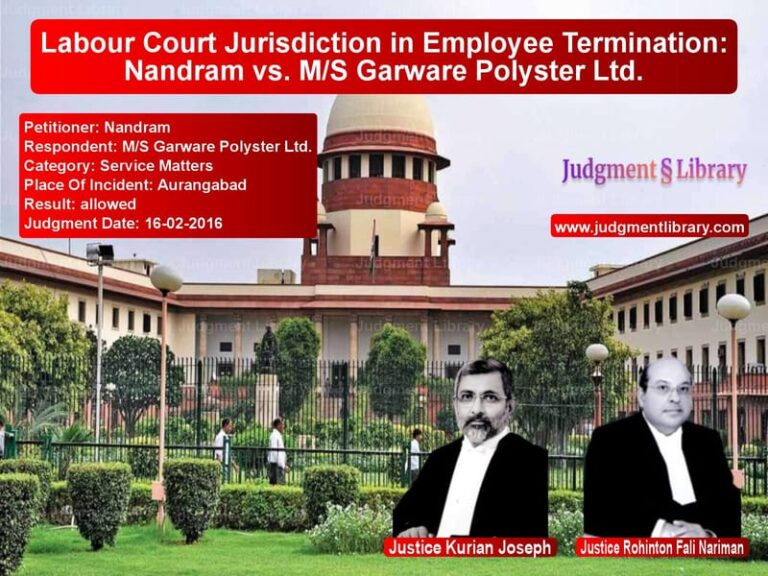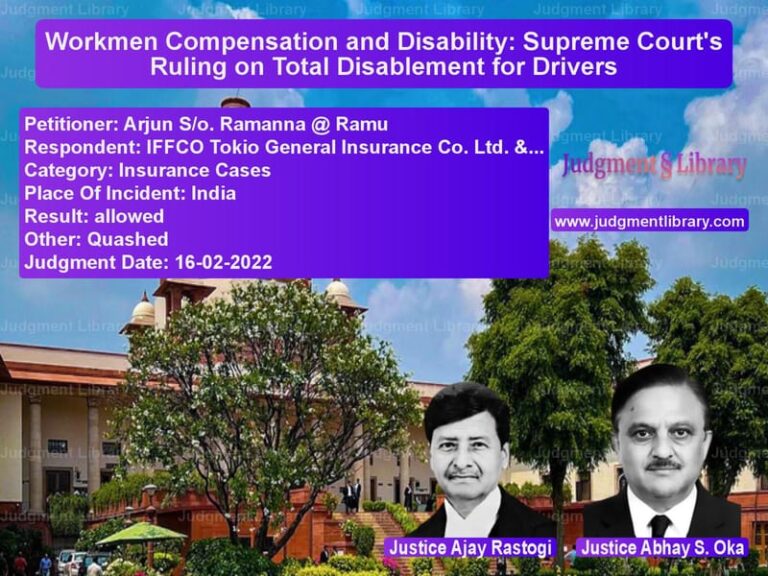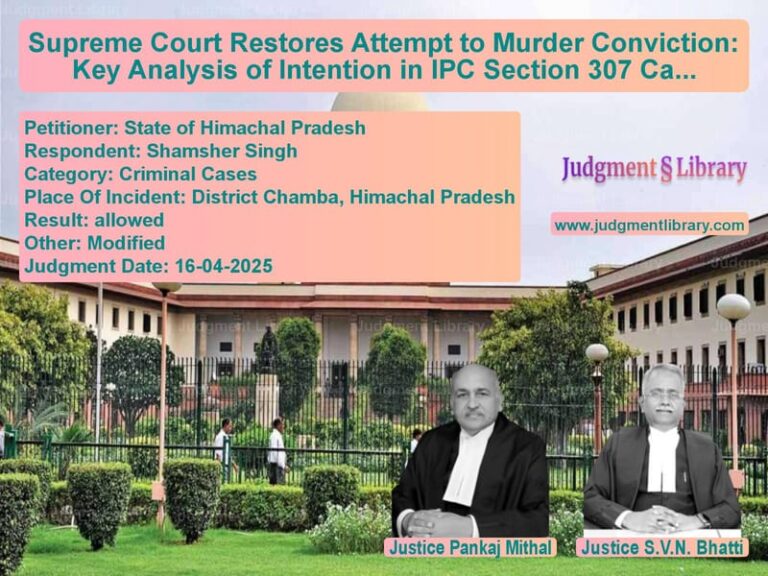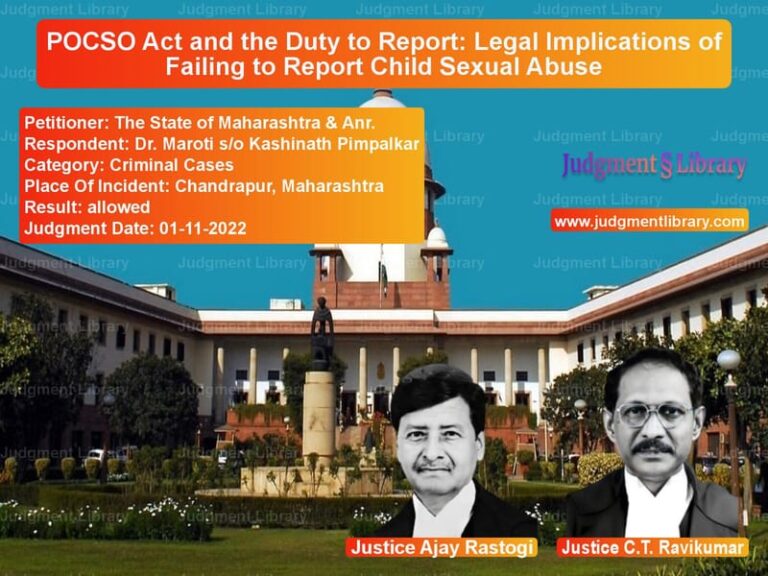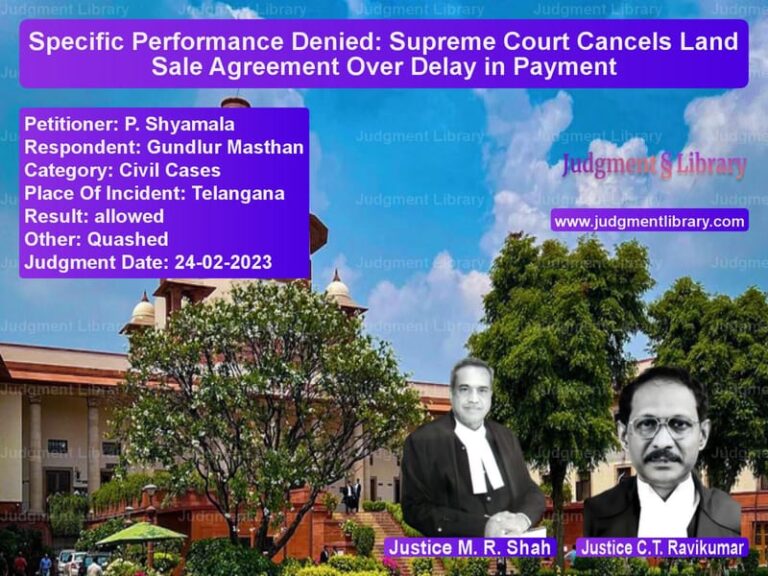Supreme Court Upholds Impleadment of Legal Heir in Property Dispute
The Supreme Court recently ruled in the case of Pappammal (Died) Through LR R. Krishna Murtii vs. Jothi & Anr., affirming the impleadment of a legal heir in an ongoing property dispute. The case revolves around a succession dispute following the death of the original plaintiff, where the appellant contested the impleadment of his sister as a defendant in the case.
Background of the Case
The dispute arose over the estate of the deceased Pappammal, who had initiated a civil suit (O.S. No. 155 of 2017) for declaration and recovery of possession. The suit was filed against R. R. Jagadesan, alleging unlawful possession of certain immovable property.
The key timeline of events:
- 2017: Pappammal filed the civil suit against R. R. Jagadesan.
- January 10, 2020: Pappammal passed away at the age of 97.
- 2020: The appellant, R. Krishna Murtii, moved an application (I.A. No. 1 of 2020) seeking substitution as the sole legal heir based on a registered will dated June 13, 2016.
- March 29, 2021: The Trial Court dismissed I.A. No. 1 of 2020, citing the absence of a legal heir certificate and non-joinder of other heirs.
- May 26, 2021: The Madras High Court upheld the dismissal but granted liberty to the appellant to implead other legal heirs.
- July 21, 2022: The Supreme Court overturned the High Court’s ruling, directing the Trial Court to reconsider the substitution application.
- 2023: The Trial Court allowed the substitution of the appellant as plaintiff.
- January 7, 2023: Respondent No. 1 (Jothi, the deceased’s daughter) filed I.A. No. 6 of 2023 to implead herself as a defendant, contesting the will.
- March 4, 2023: The Trial Court allowed her impleadment.
- 2024: The Madras High Court dismissed the appellant’s challenge and upheld the Trial Court’s decision.
- February 27, 2025: The Supreme Court affirmed the impleadment and dismissed the appeal.
Petitioner’s Arguments (R. Krishna Murtii)
The appellant contended:
- He was the sole beneficiary of the registered will executed by the deceased.
- Since the Supreme Court had earlier ruled in his favor, the Trial Court erred in allowing the impleadment of Respondent No. 1.
- The contesting legal heir had no locus standi to challenge the will.
- The will should be deemed conclusive proof of succession, barring further claims.
The appellant argued:
“The impleadment of Respondent No. 1 as a defendant is unnecessary and contrary to the ruling of the Supreme Court allowing my substitution as plaintiff.”
Respondent’s Arguments (Jothi)
The respondent, Pappammal’s daughter, countered:
- As a natural legal heir, she had the right to challenge the authenticity of the will.
- The appellant’s claim was disputed and required adjudication through proper legal channels.
- The Trial Court had the authority under Order I Rule 10(2) of CPC to add necessary parties.
- The High Court correctly held that all interested parties must be heard before deciding the property dispute.
The respondent argued:
“The purpose of a trial is to reach the truth, and all necessary parties must be heard before a decision is made.”
Supreme Court’s Observations
The Supreme Court examined the legal framework governing impleadment in succession cases. Key observations included:
- The Court reaffirmed that the impleadment of a legal heir is necessary to ensure a fair adjudication.
- The previous ruling allowing substitution of the appellant did not preclude other legal heirs from contesting the will.
- The respondent was a direct descendant of the deceased, making her an interested party.
- The will’s authenticity could not be assumed at the substitution stage.
- The principle of natural justice necessitates hearing all potential heirs before a final decision on the estate.
The Court ruled:
“The insistence of the appellant on non-impleadment of Respondent No. 1 is wholly erroneous. A fair trial requires all interested parties to be heard.”
Final Judgment
The Supreme Court ruled:
- Dismissed the appeal challenging the impleadment.
- Upheld the High Court’s order allowing the respondent to be impleaded as a defendant.
- Directed the Trial Court to proceed with the case with both parties as litigants.
The Court concluded:
“The entire purpose of a trial is to reach the truth. All necessary parties must be heard before a final decision is taken.”
Conclusion
The Supreme Court’s ruling reinforces key principles of inheritance and civil procedure:
- Impleadment of interested parties is essential in property disputes.
- A will does not automatically negate claims by other legal heirs.
- Civil courts have discretion under Order I Rule 10(2) of CPC to add necessary parties.
- The principle of natural justice requires that no heir be excluded from legal proceedings.
This judgment ensures that inheritance disputes are resolved equitably by considering the claims of all concerned heirs, preventing unfair outcomes based on unilateral claims.
Petitioner Name: Pappammal (Died) Through LR R. Krishna Murtii.Respondent Name: Jothi & Anr..Judgment By: Justice Sudhanshu Dhulia, Justice Prashant Kumar Mishra.Place Of Incident: Perambalur, Tamil Nadu.Judgment Date: 27-02-2025.
Don’t miss out on the full details! Download the complete judgment in PDF format below and gain valuable insights instantly!
Download Judgment: pappammal-(died)-thr-vs-jothi-&-anr.-supreme-court-of-india-judgment-dated-27-02-2025.pdf
Directly Download Judgment: Directly download this Judgment
See all petitions in Succession and Wills
See all petitions in Landlord-Tenant Disputes
See all petitions in Property Disputes
See all petitions in Judgment by Sudhanshu Dhulia
See all petitions in Judgment by Prashant Kumar Mishra
See all petitions in dismissed
See all petitions in supreme court of India judgments February 2025
See all petitions in 2025 judgments
See all posts in Civil Cases Category
See all allowed petitions in Civil Cases Category
See all Dismissed petitions in Civil Cases Category
See all partially allowed petitions in Civil Cases Category


